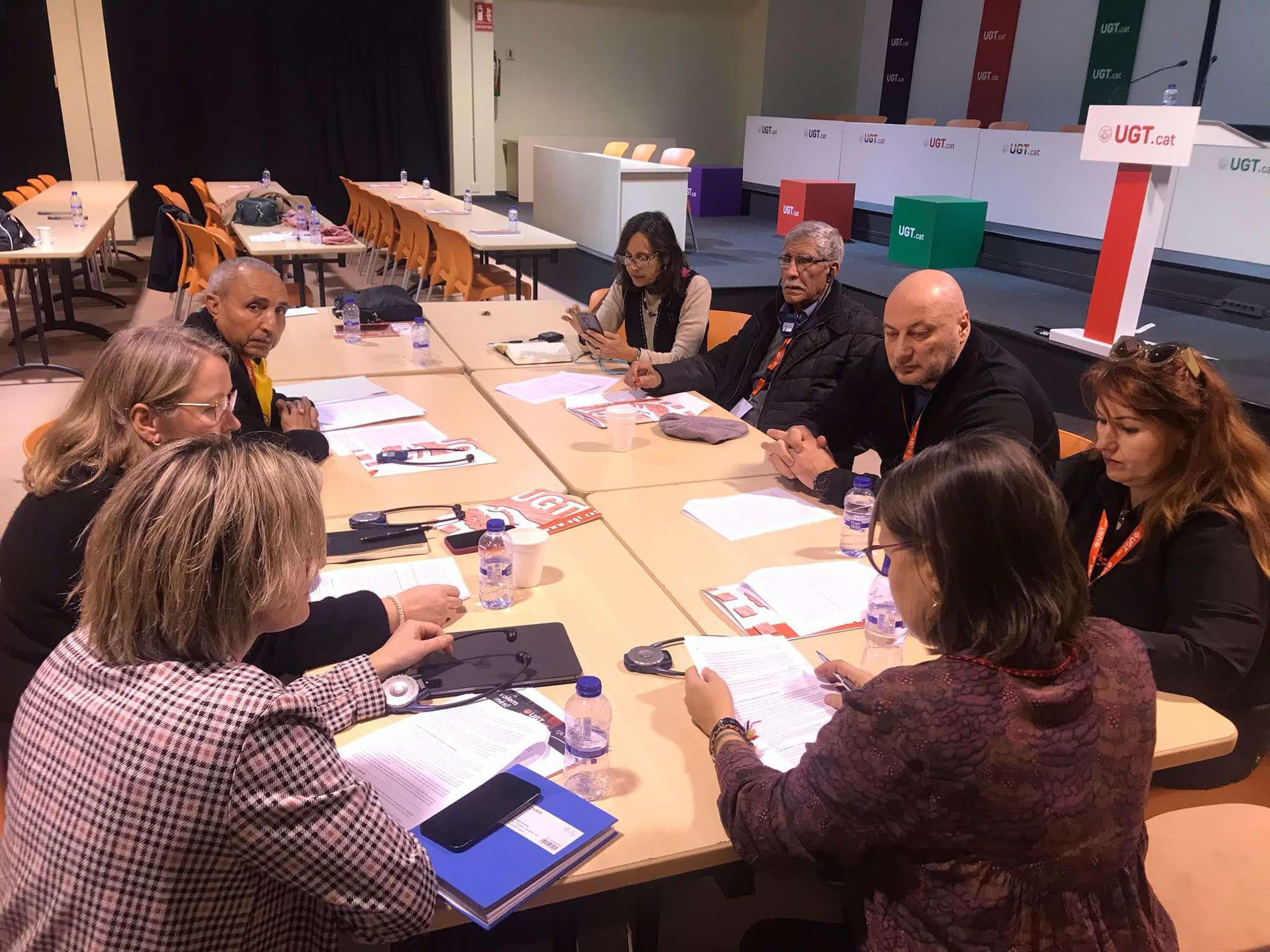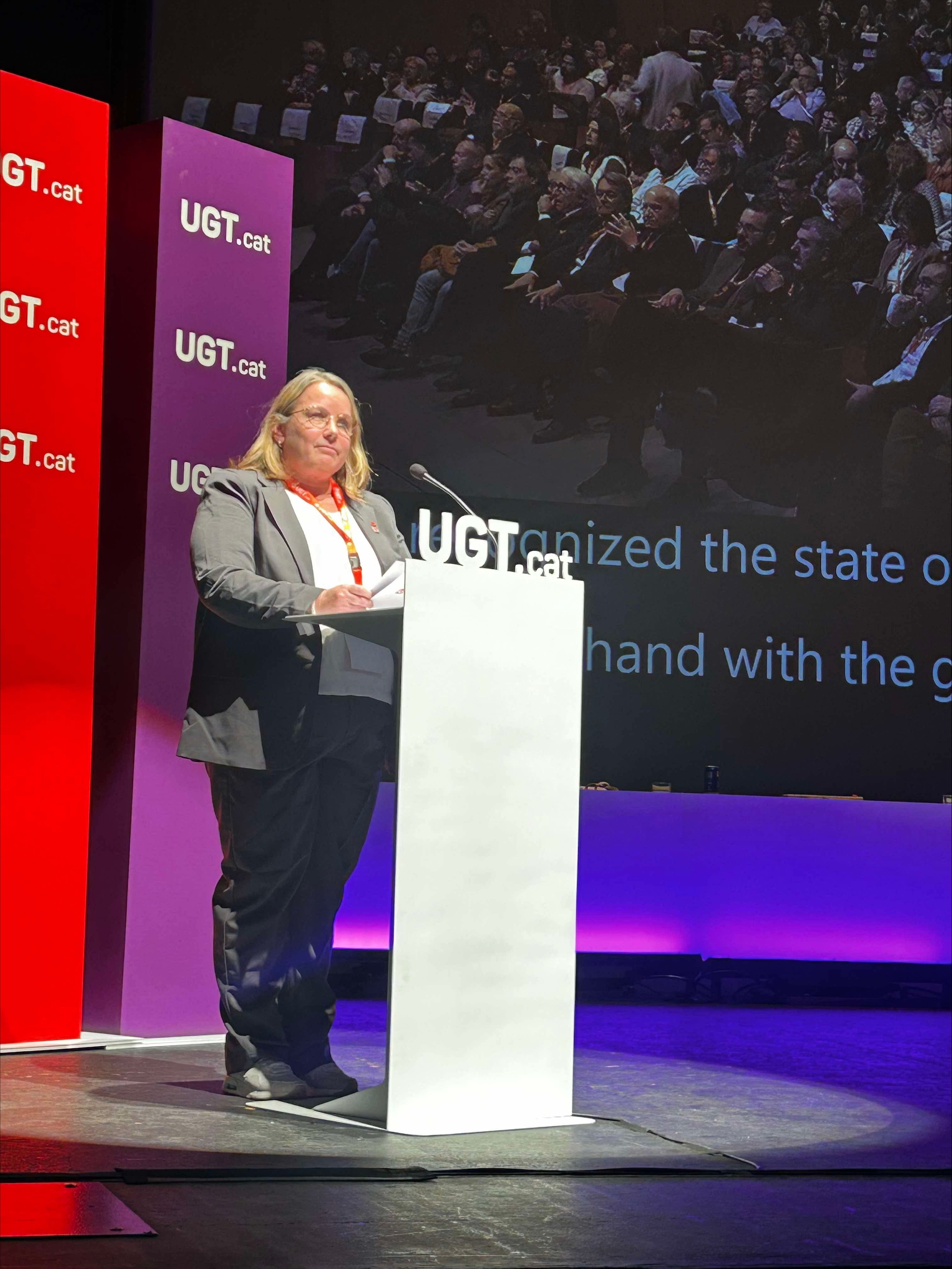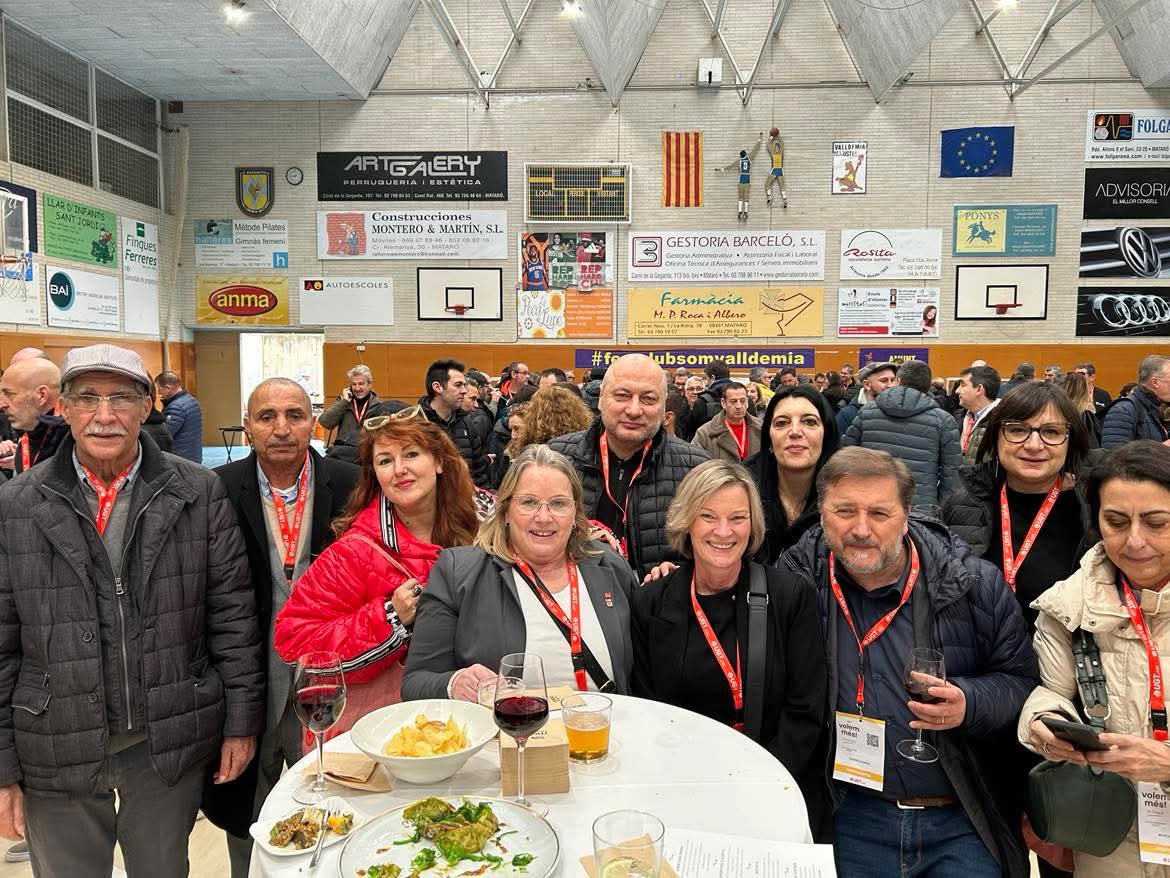Telefon: +4797572507
E-post: Kari.Hoset.Ansnes@lo.no

Invitasjonen kom etter studieturen som LO favørkomiteen i Møre og Romsdal hadde sammen med UGT i 2024
UGT Catalonia arrangerte et internasjonalt seminar dagen før deres lokale kongress, der var det representanter fra Italia, Frankrike, Ukraina, Marokko og Norge. På seminaret var det mange innledninger og diskusjoner ut fra hva de ulike fagforeningene fokuserte på. Det er mange likhetstrekk på utfordringene, men det er også mye de andre står i som vi ikke har måttet oppleve. Til slutt jobbet vi frem et fellesdokument, som vi alle kunne stille oss bak. Ligger vedlagt i saken.

Bilde: Gruppearbeid under det internasjonale seminaret. Norge, Spania, Marokko og Ukraina jobbet sammen her
Vi fikk så være med på åpningsdagen på UGT Catalonia sin kongress, som ble avholdt i et stort teater i byen Matarò, litt utenfor Barcelona. Deres lokale kongress var veldig mye større enn vår regionkonferanse, med 440 delegater, og i tillegg mange nasjonale og internasjonale gjester. Vi fikk gi en hilsningstale på vegne av de internasjonale gjestene, og fikk se og høre om aktiviteten UGT Catalonia har gjennomført. På samme måte som i Norge, så har de mange dedikerte tillitsvalgte som jobber godt for medlemmene sine.

Bilde: Kari holder hilsningstale til UGT Catalonia sin kongress på vegne av de internasjonale gjestene
UGT Catalonia tok godt imot oss, og satte opp et veldig godt program, som også inneholdt en historisk gjennomgang av fagbevegelsen i Spania, og også en historisk guidet gåtur gjennom Matarò og tilhørende besøk på noen museer som beskrev mye arbeiderhistorie.

Bilde: Deler av den internasjonale delegasjonen under en av lunsjene. Lunsjen ble servert i en stor idrettshall, der det var stående buffet med masse lokale retter.
Kristine Svendsen fra LO Trøndelag og Kari Hoset Ansnes fra LO Møre og Romsdal takker for invitasjonen og muligheten til å reise ned på denne kongressen. Det har gitt oss inspirasjon og flere perspektiver vi tar med oss videre i arbeidet
PROPOSED TEXT FOR A JOINT TRADE UNION DECLARATION - MATARÓ 22 JANUARY 2025
The rise in poverty and the loss of purchasing power have been among the most significant economic impacts suffered by workers worldwide in recent years. Today, we continue to see how economic and political control remains concentrated in the hands of a few wealthy elites, while the increasingly impoverished working-class population has fewer rights and while the gap between rulers and the governed keep growing. Skepticism toward democracies is rising, as they have failed to put people at the center of their policies; instead, capital and the private interests of great fortunes dictate the direction of national and global economies.
From the global trade union movement, we emphasize the need for political interventions focused on social justice and a social basis for all in order to address wage inadequacy, job insecurity, and significant inequalities, ensuring a fair and sustainable economic and social recovery at all levels – locally, regionally, and globally.
We defend the right to every individual to a dignified and peaceful life, based on equal rights and work for all, regardless of gender, age, sexual orientation, religious beliefs, race, language, political opinion, place of birth, or any other distinguishing characteristic. Diversity is a value, never a barrier.
We defend collective human rights because solutions are always achieved and fought together.
Today, freedom and democracy are under attack worldwide.
We face a growing wave of authoritarian and totalitarian regimes that neither respect the limits of their power nor protect the freedom and rights of workers, minorities, civil society, or unions.
As unions, we are in a privileged position to lead the fight for democracy. Our structures promote deliberation, negotiating consensus and collective action, empowering workers to defend their rights and interests.
We must engage in the fight for democracy on all fronts: in our workplaces, our countries, and on the global stage. Only through increased cooperation between trade union organizations around the world can we guarantee the continuity of the class struggle to build more democratic societies and ensure respect for workers' dignity in our society and worldwide.
The world is undergoing a realignment, and the international trade union movement must ensure that it is organized workers, through their unions, who lay the foundations for democracy to prevail. A robust and responsive democracy in which workers collectively set the direction of their communities, workplaces, countries, and international institutions. We demand real democracy.
The last year saw a rise in the number of armed conflicts worldwide, the highest number in over a decade. Forced displacements on a massive scale continued to be one of the most glaring and dramatic effects of armed conflicts, affecting millions of lives globally and setting new record highs year after year.
International solidarity has played a vital role throughout history in demanding and maintaining peace and must do so again. Peace is a central value of global trade unionism. We defend social justice to ensure that peace is stable and enduring. Universally, we categorically oppose the use of violence to subjugate a people or as a tool of repression.
The absolute rejection of war and the atrocities it entails must lead to the establishment of a framework for common security. This framework should guarantee peoples' right to defend themselves against attacks on their freedom, sovereignty, and democracy. It must be grounded in the principles of the United Nations, addressing the ideological, social, and economic causes of conflicts, and holding accountable those responsible for initiating, fueling, or supporting conflicts, as well as those committing war crimes and terrorist attacks.
From across global trade unionism, there is a united call for the peaceful resolution of conflicts around the world. All the undersigned trade union organizations express solidarity with all peoples suffering from one of the 36 conflicts recorded worldwide. We extend our hand to them and express our unwavering support.
Trade unions worldwide must unequivocally be a force for good, and they must continue to be united in upholding democratic principles and respect for human rights and international law.
Oligopolistic late-stage capitalism is entrenched, and economic neo-imperialism is stronger than ever in the 21st century. Multinational corporations, the armed arm of imperialism, continue to play a key role in the unequal economic growth within and between countries, especially impacting peripheral economies. The accumulation of capital through global production and consumption processes continues at the expense of human and natural resource overexploitation.
Millions of workers worldwide remain overexploited, earning meager wages and enduring appalling working conditions, including exposure to carcinogenic chemicals and a glaring lack of workplace safety. Child labor, forced labor, and human trafficking persist in global supply chains. In 2023, an estimated 160 million children aged 5 to 17 were victims of child labor, with nearly half engaged in hazardous work.
Environmental destruction and resource plundering also continue. Raw material mines in peripheral countries are essential for developing new technologies and sustaining current production and consumption systems, yet their exploitation benefits neither the states housing them nor the local workers.
The international community has a historical debt to end the systematic overexploitation of the Global South in the form of slavery, the exploitation of natural resources, and persistent breaches of labor and human rights rights.
Multinational corporations leading supply chains are headquartered in Western countries and major global powers. It is essential to redefine the role of states in labor relations within multinational corporations, as well as the roles of international organizations and trade unions on a global scale.
Multinational corporations must respect and implement international legal frameworks regarding human rights. They must act as active agents in actively advancing human rights instead of bypassing them. Companies should be spaces of coexistence where workers and their union representatives are active and fundamental contributors to the democratic construction of companies and workplaces.
In many cases, global corporations and the financial sector hold more economic, social, and political power than states or international organizations. They are directly or indirectly responsible for shaping and advancing global policies. They also politically and financially influence state and international community decisions and actions.
Thus, trade union organizations must play an essential role globally in governance, planning, execution, monitoring, and oversight through social dialogue. More importantly, trade unions must ensure that transparency and oversight mechanisms are in place to guarantee that final consumers have access to information about the working conditions involved in producing the goods and services they are consuming, as well as the degree of respect for human rights standards in the global production chains.
Speculation in financial markets has been the root cause of major crises in recent decades. The Great Recession of 2008 was the most recent, with unprecedented impacts on the real and productive economy. Yet, not even this stark evidence of the dangers of financial market liberalization and deregulation has prompted the international community to agree on regulation and control. Several initiatives in Europe have been thwarted.
Tax havens and offshore financial centers remain another black hole that has not been seriously addressed by any government or international legislation.
The financial powers strongly resist state intervention in these matters. Implementing any international tax, however small, would require transparency measures, ending the business of opaque operations.
A fair and progressive tax architecture must be conceived and promoted, alongside new financial instruments that assign the costs of global progress to those most able to bear them, rather than those currently suffering the most.
We will continue to demand and promote fiscal justice, the limitation and control of speculative capital that neither generates decent work nor real wealth. This requires the full implementation of the United Nations 2030 Agenda and its Sustainable Development Goals, as well as the Pact for the Future aimed at transforming global governance through comprehensive global governance structure reforms and strengthened international cooperation.
Decent and stable work is a fundamental element for social and economic progress and serves as the main mechanism for redistributing wealth.
Due to its central importance in society, decent work has been a deliberate target of neoliberal policies worldwide, which have sought to weaken, make more unstable, and deregulate labor relations. Globally, labor reforms promoted by right-wing governments have been proven unjust, unnecessary, and ineffective. Far from protecting workers and creating decent jobs, they aim to unbalance labor relations, undermine collective bargaining and social dialogue, and devalue wages, cheapen dismissals, and destroy hard-earned labor rights.
The increased lack of labor protection makes a new social contract imperative, one that ensures participation in social and economic progress, both individually and collectively, and that guarantees stringent protection systems for workers’ rights.
The future of work involves social dialogue and placing people at the center of decision-making. It must address the challenges posed by digitalization and the implementation of artificial intelligence, the energy and ecological transition, demographic challenges, as well as territorial imbalances.
Trade unions must also ensure the inclusion of millions of people currently excluded from the labor markets, guaranteeing fair wages and decent working conditions to combat the rising phenomenon of labor poverty and underemployment that affects millions of people worldwide.
The OECD highlights the significant changes the labor market will undergo due to the restructuring of economies, driven by strategies to achieve net-zero greenhouse gas emissions.
Relocating workers from high-emission industries to low-emission ones are recognized as an extremely high risk to cause job losses and wage reductions in future positions due to insufficient training required.
We advocate for strong policies to mitigate climate change while continuing to warn about the risks posed to workers by the transition to a zero-emissions economy if it is not accompanied by measures to redistribute work and income. Therefore, we must develop a new economic and labor relations model. Governments and administrations must anticipate these changes and transitions in various economic sectors to protect jobs, ensure economic and social sustainability, combat inequality and poverty, create green, decent work, and improve the conditions of existing jobs.
Training policies for workers must also be strengthened, promoting lifelong learning both through public services that develop active labor policies and within companies themselves. This aims to prevent mass layoffs linked to the transition and changes in the production model, for instance, by relocating workers within the same company.
We call for a shift to a sustainable socio-economic model capable of combining increased productivity, innovation, and knowledge with the creation of decent jobs, the improvement of social well-being, and environmental protection. This aligns with the Sustainable Development Goals of the 2030 Agenda to address the climate emergency and advance sustainability.
This socio-economic transformation must ensure the right to both a healthy environment and work, leading to a decarbonized and sustainable economy. It must promote a just transition, with new work models, skills, and opportunities for decent work, leaving no one behind.
Likewise, digitalization has transformed the way we live and work but presents numerous risks in the world of work due to automation processes. The introduction of artificial intelligence, the use of algorithms in business decision-making, automation, robotics, and remote work are displacing workers from certain jobs. The digital divide limits opportunities for many and makes their adaptation difficult, often leaving them excluded.
Trade unions must demand continuous and regulated professional training for workers to be able to adapt to a changing labor market due to digitalization. Mechanisms must be established to ensure that the benefits of the rapid technological and digital advances of this decade provide the resources necessary to transform the production system, eradicate inequalities by creating new opportunities, and improve working conditions.
These advancements must be leveraged to create decent jobs, reduce current working hours, and improve wages worldwide. Moreover, legal instruments must be in place to accompany these market transitions.
It is estimated that there are 272 million international migrants worldwide—a figure equivalent to 3.5% of the global population. The majority of people migrating to other countries do so for work-related reasons, due to inequalities and lack of job opportunities in their home countries. Others migrate for family, education, safety, conflicts or wars, persecution, disasters, or environmental changes that have heavily impacted their livelihoods. Migration has become an increasingly diverse reality, with different risks and needs, and our societies are progressively multicultural. Some of the main challenges migrants face are the violation of their rights, labor precariousness, and exploitation.
We believe that managing and incorporating cultural diversity is one of the great challenges of our time. A new immigration management model must be achieved, rooted in a cohesive democratic society, upholding the principles of equality, equity, justice, and solidarity.
For this reason, our organizations will continue to:
CGIL Lombardia LO Møre og Romsdal KVPU Ukraine
UIL Lombardia LO Trøndelag KVPU Kharkiv
CISL Lombardia UNSA Occitanie
UIL Lazio CGT Occitanie
CDT Maroc UGT Catalunya
Telefon: +4797572507
E-post: Kari.Hoset.Ansnes@lo.no